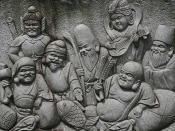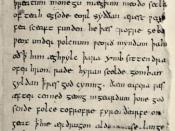In the poem, Beowulf by an anonymous author fate plays a key role in keeping Beowulf alive and letting him be victorious in all his battles. Death, that driving force behind the lives of men, is not a decision made by man, but by an unalterable inevitability set forth by the controlling forces of fate and destiny. According to the priests, God gives Beowulf the strength of thirty men in his arm, just as God gave Samson strength through his hair. God creates all people uniquely with different wonderful characteristics. Beowulf knows that his final battle with the dragon holds his fate, death. God graces people with special characteristics such as intelligence and a conscience which people use to determine between right and wrong. Essentially, people know their fate and seek that destiny, even if they may not desire to. Jesus knows that Judas will betray him yet he trusts God's decision of his fate.
Beowulf feels before his final battle that the dragon might kill him, yet he continues on with his fate.
Anglo-Saxons believe in fate, but their fate allows for free will. Beowulf goes to the Danes to save Herot by choice. Beowulf loves to fight and prove his loyalty to Higlac. Beowulf enters the world as a strong unstoppable super human man. God gives him these qualities to fight the battles against evil. Beowulf stays alive because he knows that "fate saves the living when they drive away death by themselves" (572-573). Fate keeps Beowulf alive in his battles as he survives from nine "sea-huge monsters" (575), Grendel, and Grendel's mother. Grendel and his mother spawn from hell and Beowulf fights for the heavens. His pre-determined destiny is death in spite of his extraordinary body, strength, courage, and fearlessness. Beowulf parallels with Jesus greatly, since...



Beowulf
It's a good essay, but a little short.
1 out of 1 people found this comment useful.